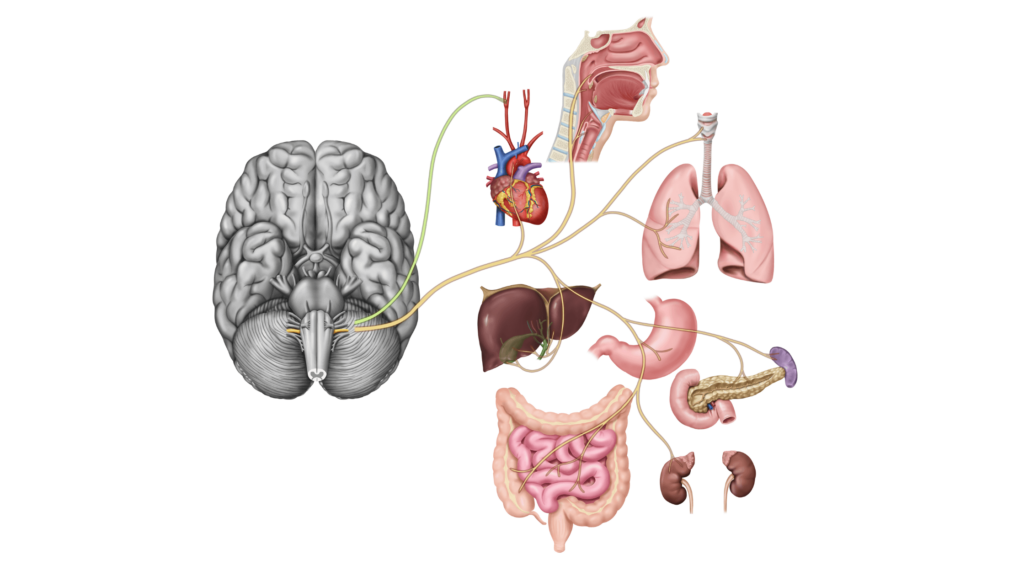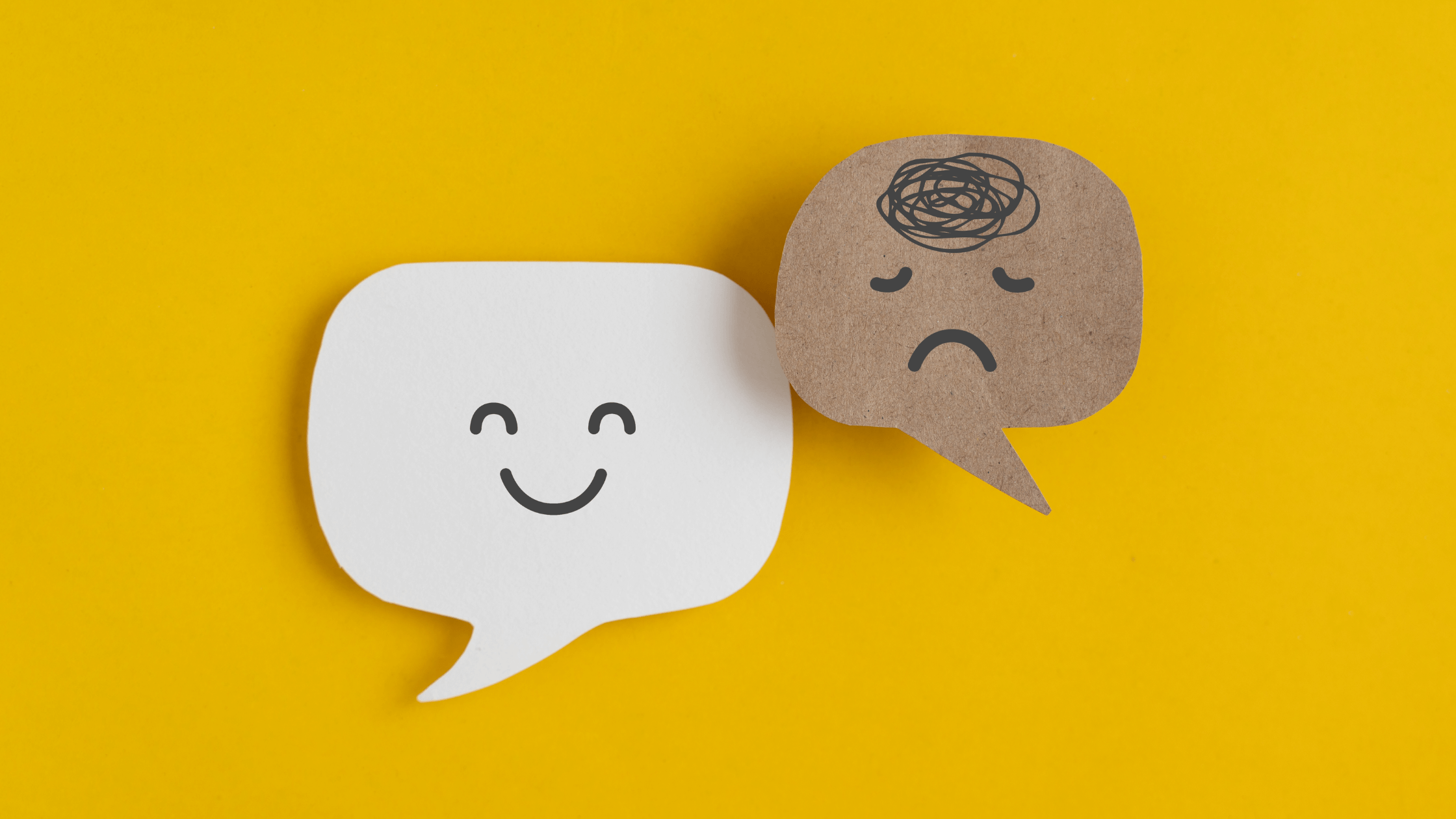When we think of taking care of mental health, we usually think of prescription medication and professional counseling. But there’s a simple (and free!) way to improve mental health: stimulate your vagus nerve. By doing so, you could improve your digestive health and immune system and improve conditions like depression, PTSD, and anxiety. Activities like deep breathing, mindfulness, and cold exposure to cold are great ways to get started with vagus nerve stimulation at home.
What is the vagus nerve?

The vagus nerve, also known as the tenth cranial nerve, is the largest in the human body and comprises thousands of fibers arranged into two bunches that stem from the brain down through either side of the neck to the torso. The primary nerve of the parasympathetic nervous system, the vagus nerve, supports digestion, rest, and calmness—it activates the “rest-and-digest” functions of the body.
The vagus nerve receives information from organs and sends it from the brain stem to the rest of the body. It helps regulate voice, heart rate, mood, digestion, and even the immune system.
This efficient bodily functionality gives the vagus nerve the nickname the “information superhighway.”
How does the vagus nerve affect the body?
Digestive health
Your vagus nerve is critical for regulating digestive function. It allows your body to release digestive enzymes, bile, and gastric acid while also controlling the contractions of your intestines and stomach. This process allows food to move through your digestive tract. When your vagus nerve is impaired or underactive, it can lead to gastrointestinal problems, including irritable bowel syndrome (IBS), gastroparesis, and mild to severe acid reflux.
Cardiovascular health
Your vagus nerve also helps regulate your blood pressure and keep your heart rate regular. When vagal tone is high, it’s associated with a lower resting heart rate, increased heart rate variability, and lower blood pressure. Heart rate variability, the time between your heartbeats, significantly indicates your autonomic nervous system balance and heart health.
Your immune system
Your vagus nerve also plays a significant role in modulating inflammation, greatly impacting overall physical health. When you suffer from chronic inflammation, you’re more at risk for a range of diseases, including metabolic syndrome, autoimmune disorders, and even neurodegenerative conditions like Alzheimer’s. When your body regularly produces pro-inflammatory cytokines, the vagus nerve helps prevent excessive inflammation. This allows your body to heal from injuries and fight off infections.
Vagal tone and mental health
Increased vagal tone significantly impacts mental health via the gut-brain axis. Stimulating your vagus nerve can positively impact your stress response, cognitive function, and mood. More specifically, vagal tone plays a role in mental health in three key areas.
- Depression: Low vagal tone is linked to an increased risk of depression. Low vagal tone has been associated with a lower parasympathetic (rest) nervous system and increased sympathetic (stimulation) nervous system responses. The imbalance here contributes to physiological symptoms of depression, like disrupted sleep, gastrointestinal issues, and fatigue.
- PTSD: Symptoms of posttraumatic stress disorder (PTSD) may improve with vagus nerve stimulation therapy, which uses an implantable device to stimulate the vagus nerve. One study found that these therapy devices could regulate the body’s response to traumatic memories compared to a placebo. Another 2020 study found that non-invasive stimulation also blocks inflammatory responses to PTSD-related trauma and lessens feelings of anger.
- Anxiety and stress: If your vagal tone is high, it’s associated with more of an ability to recover from stress, as your parasympathetic nervous system is activated. This reduces your physiological stress symptoms like muscle tension and high heart rate. It also encourages a state of relaxation. On the other hand, a low vagal tone is commonly associated with high-stress reactivity, a more difficult time coping with stress, and chronic stress issues. By increasing your vagal tone through specific practices, you can improve anxiety and stress resilience.
- Cognitive function: The association between the vagus nerve and cognitive function is an emerging area of research. Studies focus on processes like memory, attention, and executive function. So far, higher vagal tone has been associated with increased cognitive performance, most specifically in tasks that require decision-making and self-regulation.
How do you measure vagus nerve activity?
While measuring vagus nerve activity directly is difficult, it isn’t impossible. Because the vagus nerve fibers are connected with your heart, scientists can indirectly measure your cardiac vagal tone, meaning the method by which your nervous system regulates your heart.
This is done by measuring heart rate variability on an EKG. An abnormal vagal tone or minimal heart rate variability is more often associated with heart failure, diabetes, and hypertension. Conversely, a higher variability between heartbeats signifies an ideal vagal tone.
5 ways to improve your vagal tone
1. Exposure to cold

Brief exposure to cold—something as simple as splashing cold water on the face or taking a cold shower—can stimulate the vagus nerve by activating your parasympathetic nervous system. It also reduces your body’s natural stress response, and studies suggest that activities like a cold water plunge can slow your heart rate and redirect blood flow to your brain.
Try finishing your shower with a cold rinse, beginning with a 30-second interval and slowly increasing the duration. You can also start by just washing your face with cold water.
2. Exercise
Regular exercise boosts the number of blood vessels that fuel the brain, encouraging the development of neurological pathways. It also enhances connectivity between brain cells and stimulates the vagus nerve. Some claim that exercise can match or outperform medication for several conditions, including memory loss, anxiety, or depression.
Try endurance activities like cycling, jogging, and swimming. Interval training stimulates the vagus nerve and controls parasympathetic activity in the brain, which could contribute to the “runner’s high” some athletes experience.
3. Mindfulness and meditation
Meditating or practicing mindfulness encourages present-moment awareness, which can naturally stimulate the vagus nerve. It also calms the network of nerves that control various physiological processes, such as heart rate and blood pressure levels. Hypertension, increased cognitive decline, and neurodegenerative diseases are also linked.
Take breaks throughout the day to quiet your mind. Pausing, noticing your surroundings, and breathing could stimulate your vagus nerve enough to make a difference.
4. Get a massage

From the scalp to the feet, all types of massage help you stimulate your vagus nerve. The exception is a deep tissue or sports massage, which could trigger the fight or flight response. Gentle to moderate pressure is ideal, focusing on the neck, feet, and shoulders. This can help to stimulate your vagus nerve and reduce blood pressure.
Give yourself a neck and shoulder massage with an at-home tool or device. To work out the kinks in your muscles, you can also rub the soles of your feet in short strokes and do some light stretches.
5. Focused breathing
Something as simple as breathing could stimulate your vagus nerve. In particular, belly breathing and diaphragmatic breathing can activate your vagus nerve and promote relaxation. In moments of stress, many people hold their breath and deprive the vagus nerve of stimulation.
Try slow, deep belly breathing. Focus on how your breathing shifts and try to block out high-stress mental chatter by thinking more about the rhythm of your breathing.
6. Gargle or hum

Humming or gargling are simple and highly effective ways to stimulate the vagus nerve. The vibrations you feel when doing either activity are actually the vagus nerve vibrating, providing direct stimulation. It’s also backed by science. Research shows that gargling and humming can have a physialso ological effect on the body. One randomized controlled trial found that people with hypertesion who used “bee humming breathing,” (a yogic breath where you hum on the exhale for as long as possible, for five minutes saw lower blood pressure levels than the control group.
Next time you’re doing an activity, try humming your favorite tune. Or when you’re done brushing your teeth before bed, use some non-toxic mouthwash to gargle.
Bottom line
Stress is nothing new to people who work in the building industry, but the key to staying calm is finding ways to mitigate it. Regular exercise, massages, mindfulness, and exposure to cold are simple ways to stimulate your vagus nerve, improve your mental health, and enhance your overall sense of well-being.
What’s more, improving your vagal tone can help with conditions like PTSD, depression, anxiety, and your overall cognitive function. It can even aid the body in enhancing your immune system and cardiovascular health.
Although the ways to stimulate your vagus nerve seem simple on the outside, they can greatly impact your body, physically and mentally.
For more on health and wellness, subscribe to the newsletter.


